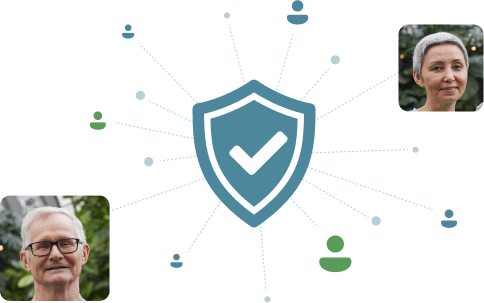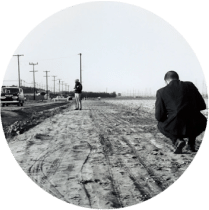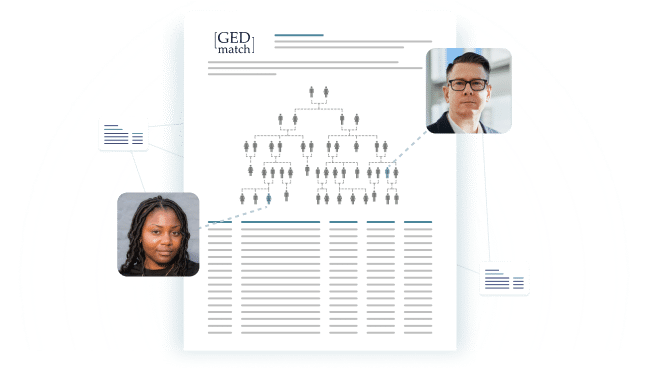
Jane and John Doe
Newton County Finds Relief After 30 Years
After roughly 30 years, the bodies of three murder victims were laid to rest in rural Newton County, Indiana.
Since 2018, GEDmatch has been used to promote community safety and bring closure to families of missing persons. Below are highlighted a few stories of how GEDmatch has been used for those purposes.


After a half-century, the Orange County police department was able to identify the killer of Anita Louise Piteau, a 26-year-old woman who left Maine for a chance to explore California.

After roughly 30 years, the bodies of three murder victims were laid to rest in rural Newton County, Indiana.

On July 17, 2019, Tapp’s murder conviction was vacated. It was believed to be the first time that genetic genealogy has been used to exonerate a defendant.

In November of 2020, Roy Charles Waller was found guilty of 46 criminal charges in connection to 21 rapes across Northern California, most of which happened decades ago.

Genetic genealogy made it possible for Terry Duggs’ family to find closure years after his disappearance.

After her murder in 1981, 21-year-old Marcia King’s body remained unidentified for 36 years. It wasn’t until genetic genealogy was introduced in 2018 that connections began to be made.

By uploading your genetic data to GEDmatch you can empower law enforcement to provide answers to those with missing loved ones. You can also choose to opt in and enable law enforcement to solve violent crimes and exonerate the falsely accused. GEDmatch has already contributed to the successful resolution of more than 400 investigations thanks to the generosity of those who have voluntarily uploaded their DNA files and have consented to their data being included in law enforcement comparisons.
Traditional eyewitness testimony has long been an important part of law enforcement investigations and now your DNA can help too. DNA can act as a molecular eyewitness, providing the approximate age, hair color, eye color, or skin tone of a person of interest. DNA also helps identify people through distant family connections. In a process known as genetic genealogy, family trees can be constructed from sections of DNA passed down from generation to generation.
Genetic genealogy has allowed families to connect, adoptees to identify birth parents, and foundlings to discover their identities. Now it is being used by investigators to make identifications when all other methods have failed.
While genetic genealogy gained notoriety for resolving high-profile criminal cases, its impact is much wider than headlines suggest. DNA can shine a light on miscarriages of justice, freeing those who are wrongly imprisoned. It can also give a name to unidentified remains, bringing closure to families wondering what happened to their missing loved ones. Currently, there are more than 14,000 unidentified bodies in the US alone.1 Each one of them is related to someone, and each one of them is waiting for their name to be restored.
No, law enforcement does not get to see your raw DNA data when you consent to allow your data to be included in those types of searches. Just like any other user of GEDmatch, law enforcement can only see your name or GEDmatch alias, email address, and how much DNA you share with the law enforcement profile. Law enforcement uses a purpose-built website called GEDmatch PRO where they upload the investigative profile and let the GEDmatch algorithms do the matching.
When sharing any information with law enforcement, there are risks to consider before deciding to opt in. For example, you might learn things about yourself or your family that are difficult to hear. There is the possibility that your relatives may be contacted if their DNA could help guide investigators to the correct part of a family tree. The question on whether to opt in is ultimately a personal one: Does the opportunity to resolve investigations and help other families outweigh the potential risks?
GEDmatch provides four categories of privacy options when you upload your DNA kit. Once uploaded, you can easily change from one category or another when you wish.
Privacy Category | What does it mean ? |
Private | Your kit is not available for comparisons with any other kits. No comparison results will be shown unless you change this setting to another privacy category. |
Research | Your kit will not be shown in match result reports generated for other kits. This option is primarily for artificially-created research kits. It may occasionally be used for regular uploads if you have specific reasons for doing so. |
Public + Opt-Out
| Your kit will be included in all searches performed via the GEDmatch website for the purpose of general public genetic genealogy research. Your kit will also be included in all searches performed via the GEDmatch PRO website for the purpose of identifying unidentified human remains. Your kit will not be included in GEDmatch PRO searches relating to violent crimes. |
Public + Opt-In
| Your kit will be included in all searches performed via GEDmatch and GEDmatch PRO including searches relating to violent crime. |
Resources
Email
support@gedmatch.com
Address
19300 Germantown Rd.
Germantown, Maryland
20874